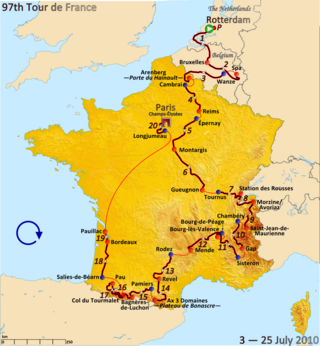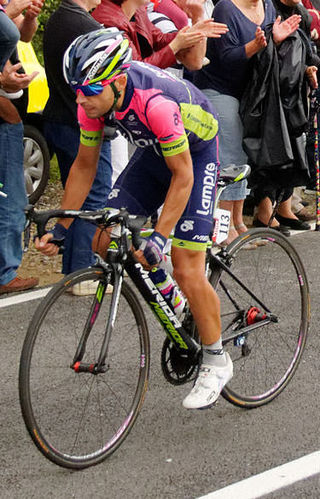
Jan Ullrich is a German former professional road bicycle racer. Ullrich won gold and silver medals in the 2000 Summer Olympics in Sydney. He won the 1999 Vuelta a España and the HEW Cyclassics in front of a home crowd in Hamburg in 1997. He had podium finishes in the hilly classic Clásica de San Sebastián. His victorious ride in the 1997 Tour de France led to a bicycle boom in Germany. He retired in February 2007.

Alessandro Petacchi is an Italian former professional road racing cyclist, who rode professionally between 1996 and 2015. A specialist sprinter, Petacchi has won 48 grand tour stages with wins of the points jersey in the Giro d'Italia in 2004, the Vuelta a España in 2005 and the Tour de France in 2010. He also won the classics Milan – San Remo in 2005 and Paris–Tours in 2007. His career spanned over 18 years during which he earned 183 victories.
Groupama–FDJ is a French cycling team at UCI WorldTeam level. The team is managed by Marc Madiot, a former road bicycle racer and winner of the Paris–Roubaix classic in 1985 and 1991. The team is predominantly French.

Danilo Hondo is a German former professional road bicycle racer. He won the German National Road Race in 2002. He competed in the men's team pursuit at the 1996 Summer Olympics.

CCC Pro Team was a UCI WorldTeam co-owned and managed by American cyclist Jim Ochowicz, who founded the 7-Eleven Cycling Team. After its last title sponsor, CCC, a Polish shoe retailer, pulled out due to financial difficulties resulting from the COVID-19 pandemic, Ochowicz was unable to find another major sponsor, so the team disbanded at the end of the 2020 season. In its place, Belgian UCI ProTeam Circus–Wanty Gobert took over the team's license and was promoted to a UCI WorldTeam.

The 2010 Tour de France was the 97th edition of the Tour de France cycle race, one of cycling's Grand Tours. It started on 3 July with an 8.9 km prologue time trial in Rotterdam, the first start in the Netherlands since 1996. The race visited three countries: the Netherlands, Belgium and France, and finished on 25 July on the Champs-Élysées in Paris.

Katusha–Alpecin was a Russian road bicycle racing team which competed at the UCI WorldTeam level using Canyon bikes. The team was created in 2008 by Igor Makarov, an ex-professional cyclist and entrepreneur. In 2017 the team took a broader international direction, still supported by Igor Makarov's company ARETI International Group, Swiss clothing company Katusha Sports and German shampoo manufacturer Alpecin. The team competed as a UCI ProTeam/WorldTour team between 2009 and 2019. Joaquim Rodríguez, Alexander Kristoff, Daniel Moreno, Simon Špilak, Filippo Pozzato, Luca Paolini, Ilnur Zakarin and Tony Martin are some of the most successful riders who rode for Katusha.

Thomas De Gendt is a Belgian former road racing cyclist, who competed as a professional from 2009 to 2024.

Kristijan Koren is a Slovenian former professional road racing cyclist, who rode for UCI Continental team Adria Mobil.

Stefan Denifl is an Austrian former professional cyclist, who rode professionally between 2006 and 2018 for seven different professional teams. In 2019, Denifl confessed to doping during a five-year period in his career, and was given a four-year ban from the sport; as a consequence of this, Denifl received a two-year sentence in 2021 for serious commercial fraud.

Kristijan Đurasek is a Croatian professional road bicycle racer, who most recently rode for UCI WorldTeam UAE Team Emirates. He has been competing since 2005, and has represented Croatia at two Summer Olympic Games, in 2012 and 2016.

Riccardo Zoidl is an Austrian cyclist, who rides for UCI Continental team Team Felt–Felbermayr.

Georg Preidler is an Austrian cyclist, who rode professionally between 2010 and 2019. He won the Austrian National Time Trial Championships in 2015 and 2017, and was stripped of a third title won in 2018.

Jarlinson Pantano Gómez is a Colombian racing cyclist, Pantano previously rode professionally between 2012 and 2019 for the Colombia, IAM Cycling and Trek–Segafredo teams, before he was suspended for four years after a positive drugs test for erythropoietin (EPO).

Austria competed at the 2016 Summer Olympics in Rio de Janeiro, Brazil, from 5 to 21 August 2016. It was the nation's twenty-seventh appearance at the Summer Olympics. Austrian athletes have appeared in every edition of the Summer Olympic Games, with the exception of the 1920 Summer Olympics in Antwerp. The Austrian Olympic Committee confirmed a squad of 71 athletes, 37 men and 34 women, to compete across 22 sports at the Games. The nation's full roster had one more participant than the previous two Games.

The 2015 Tour de Suisse was the 79th edition of the Tour de Suisse stage race. It took place from 13 to 21 June and was the seventeenth race of the 2015 UCI World Tour. It started in Risch-Rotkreuz and finished in Bern. The race was composed of nine stages including two time trials, a short one on the first day and a long one on the last day. The event covered 1,262.6 kilometres, and visited Liechtenstein and Austria on its fifth stage, which was the race's sole mountaintop finish.

Mark Pavlovych Padun is a former Ukrainian cyclist.
Amaro Manuel Raposo Antunes is a Portuguese cyclist, who last rode for UCI Continental team W52 / FC Porto. In May 2019, he was named in the startlist for the 2019 Giro d'Italia. On 2 March 2023, he was suspended for doping retrospectively from 5 December 2022 until 5 December 2026 by the UCI. Some of his results including the 2017 and 2021 Volta a Portugal overall wins were then annulled.
Aqua Blue Sport was an Irish UCI Professional Continental cycling team founded in January 2017 which folded at the end of the 2018 season.



















